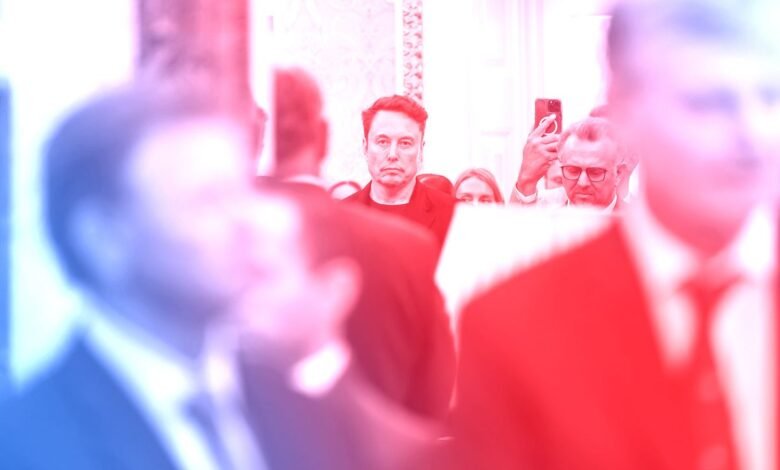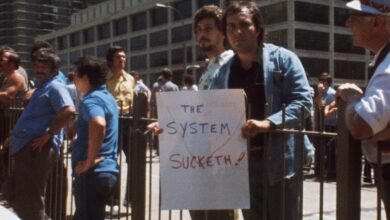
It ended, of course, with a tweet. Late on Wednesday evening, Elon Musk announced the official end of his short, traumatic tenure as the head of a made-up agency called the Department of Government Efficiency. Musk’s post on X, the social-media network he owns and had sought to weaponize in service of a radical cost-costing assault on the federal government, was brief. After thanking Donald Trump for “the opportunity to reduce wasteful spending,” the world’s richest man, deflated but still defiant, added, “The @DOGE mission will only strengthen over time as it becomes a way of life throughout the government.”
The reviews of Musk’s rampage through Washington have been, deservedly, vicious: Who, during the past few crazy months, could have possibly failed to take note of his toxic combination of entitlement and ignorance, his vastly overstated claims, and his move-fast-and-break-things ethos that has resulted in wreckage that will take years to fully assess? Musk, the largest individual donor in a single election cycle in American history, seemed to truly believe what his critics feared—that his hundreds of millions of dollars spent on behalf of Trump and Republican causes had purchased him an outsized share of the Presidency itself. He sought to collect in unprecedented fashion, installing himself in the White House at Trump’s side, helicoptering around on Marine One with his young son in tow, speaking at Cabinet meetings though he held no formal Senate-confirmed seat at the table. He demanded sensitive government data on millions of Americans, empowered a former intern known online as Big Balls, and blew up the U.S.’s foreign-aid program. In February, he cavorted onstage at a conservative event with a chainsaw—no metaphorical subtlety there—and, when he fired thousands of workers and abolished entire agencies, he became the gleeful personification of the G.O.P.’s decades-long campaign to denigrate and downsize America’s federal government.
In a round of exit interviews this week, Musk has sounded all the predictable notes of a naïve billionaire businessman mugged by Washington’s political reality. He told the Washington Post that he found things were “much worse” than he’d realized inside the federal bureaucracy, and that it actually turned out to be an “uphill battle” to take that chainsaw to the government. In an interview on “CBS News Sunday Morning,” he started the messy work of separating himself from the President. “I was, like, disappointed to see the massive spending bill, frankly,” Musk admitted, given that Trump’s “big, beautiful” tax cuts for the rich and spending cuts for the poor will add trillions of dollars to the budget deficit. Stating the obvious, which, these days, counts as an act of lèse-majesté among the Republican sycophants who surround Trump, Musk added that the measure “undermines the work that the DOGE team is doing.” (What a “lie,” Stephen Miller, Trump’s deputy chief of staff, said, though it was not.) Trump himself, as is often the case, was embarrassingly direct about why he had sold out Musk. “We have to get a lot of votes, we can’t be cutting—we need to get a lot of support,” he told reporters in the White House on Wednesday when asked specifically about the comment from Musk. Revealingly, Trump never even mentioned Musk’s name.
Watching Trump casually brush off the sidekick who stuck to him like glue for most of the Administration’s first few months, I couldn’t help but think of Reince Priebus, the first-term White House chief of staff, who was dumped via tweet while deboarding Air Force One and left on the tarmac of Joint Base Andrews as Trump’s motorcade roared off without him. The truth is that Trump can hardly afford one of those messy divorces at which both he and Musk excel; he still needs Musk, who has talked of spending another hundred million dollars of his fortune to help pro-Trump groups before next year’s midterm elections. The oligarch may have left the building, but it’s not clear the President can afford to live without him.
I was in Madison Square Garden last October when Musk, during an election rally for Trump, claimed that he would slash an incredible two trillion dollars, at least, from the U.S. budget—a remarkable bit of bravado that got less attention than the rally’s headline-making racism and its Trump-as-Dear-Leader vibe. Later, Musk dialled his ambitions back to cutting a cool trillion dollars. Of course, that was never going to happen, either, as anyone who’d ever spent a minute in Washington could have told Musk, had he cared to listen.
For all of Musk’s breathless early claims of “revolution,” the final tally of his efforts appears to have been somewhere around a hundred and fifty billion dollars. And even that is unlikely to stand. Many of the savings that Musk bragged about on the DOGE website proved to be nonexistent; numerous agencies and departments he attacked are now suing to block the wave of firings and cuts that he set in motion. In the end, his reckless approach to cutting, with little or no thought to the consequences, may cost the government as much as a hundred and thirty-five billion dollars this fiscal year alone, according to recent estimates from the Partnership for Public Service. Turns out it’s not cheap to place tens of thousands of workers on paid leave and to rehire mistakenly fired employees, never mind dealing with the lost productivity of a traumatized and uncertain workforce. Who’d have thought?
Musk’s failure to follow through on his boasts, though, should not detract from a clear-eyed assessment of the extraordinary amount of damage he succeeded in wreaking. The wise men are laughing Musk out of town, and I get it. His “performative vandalism,” as Jonah Goldberg put it on CNN, was in some respects just a pernicious, highly dangerous new variant of a Washington perennial: the pol who makes promises he cannot keep. But it is hard to think of any other unelected official who has done so much harm to the U.S. government in such a short period of time. The fact that the deficit may get even bigger at the end of the day only worsens the injury.
A few hours before Musk’s announcement, I spoke with one of his many thousands of victims. Until a few weeks ago, Mary Boyle was a commissioner at the Consumer Product Safety Commission, the historically bipartisan agency that, for more than fifty years, has insured that America’s car seats and toaster ovens and baby strollers are safe. Boyle, one of three Democratic appointees on the commission, recounted how Musk’s men had effectively ended her office’s work in a matter of hours. First came the rumor, on the evening of Wednesday, May 7th: “DOGE is coming.” By 2 P.M. the next day, two young men had appeared at the agency’s offices, in Bethesda, Maryland. At 3:45 P.M., Boyle and the other commissioners received an e-mail from the commission’s acting Republican chairman, informing them that he planned to bring on the two DOGErs who, “at no expense to the Commission,” would help the agency “with the assessment and enhancement of internal processes and operational procedures.” The commissioners had until 6 P.M., he said, to let him know “whether I have your support.” It would be funny if it weren’t the kind of thing that should have remained inconceivable in a functioning democracy: Here are the guys who are going to put us out of business, and they come real cheap. Boyle sent her reply, a single-word e-mail: “No.” Not even an hour later, while pulled over at a rest stop on the New Jersey Turnpike, she received a response of sorts, from Trent Morse, the deputy head of the White House’s personnel office: “Mary, on behalf of President Donald J. Trump, I am writing to inform you that your position on the Consumer Product Safety Commission is terminated effectively immediately. Thank you for your service.”
It did not seem to matter that the Consumer Product Safety Commission had been set up by Congress, had its budget provided by Congress, and had its commissioners confirmed by Congress. The law itself governing the agency, first passed back in 1972, could not be more clear: there were only two reasons to fire a commissioner—“neglect of duty” or “malfeasance in office.” Boyle now finds herself as the lead plaintiff in a case she never expected to file: Boyle v. Trump. Although the attack on her agency was “brazen” and “baldly illegal,” Boyle told me that she knows it just might succeed. The day after she and her colleagues filed their lawsuit last week, the Supreme Court indicated that it might strike down the precedent dating back to the New Deal era that protects the commissioners of independent agencies from being fired by the President. In the meantime, you can forget about new rules to restrict potentially dangerous ion batteries in e-bikes and scooters that the Consumer Product Safety Commission was working on. Thanks, Elon.
Musk’s casualties are not only in Washington but all over the world, in refugee camps and scientific labs whose funding was abruptly cut off, in national parks you can’t get into this summer, and in communities across the country where polluters will no longer be prosecuted. All of this upheaval “is going to affect the functioning of the government in ways we can’t even anticipate,” Boyle told me. She is right. We have been warned. ♦




